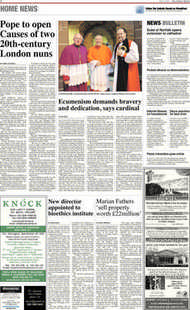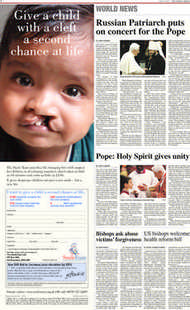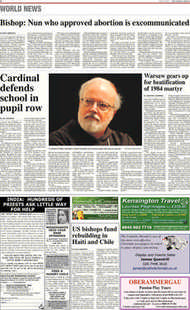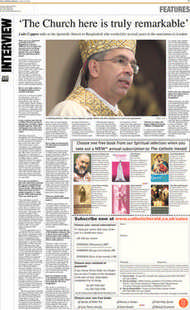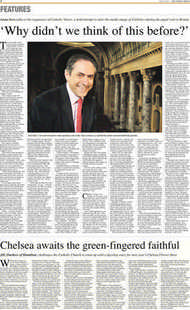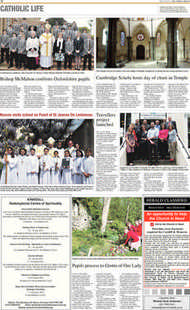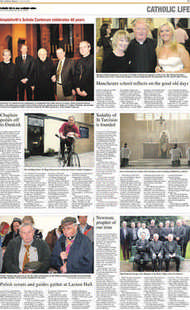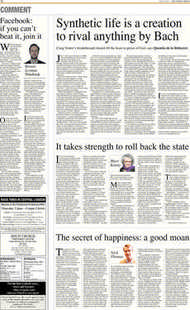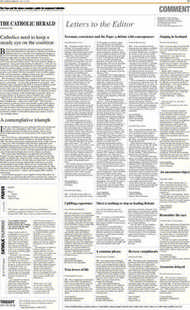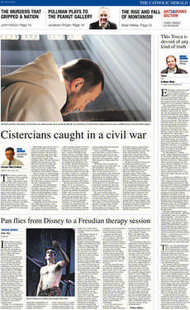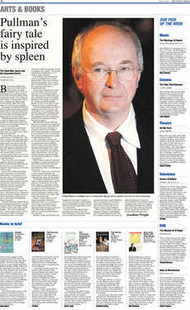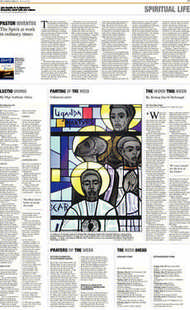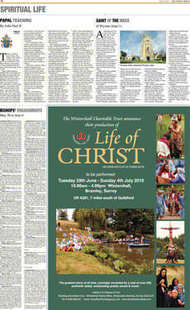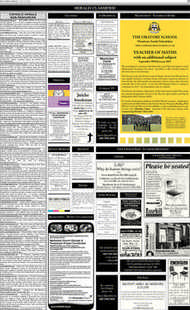Page 13, 28th May 2010
Page 13

Report an error
Noticed an error on this page?If you've noticed an error in this article please click here to report it.
Tags
Share
Related articles
In This Time Of Crisis I Feel Deep Gratitude To Newman...
Conscience And The Pill
Debating Newman
Cardinal Newman And The Uses Of `conscience'
Defining Conscience
Newman, conscience and the Pope: a debate with consequences
From Mr Andrew Gray SIR – The debate (Letters, May 21 and May 28) around the rights of conscience and obedience to the teachings of the Church hinges on the obligation for the human person to conform his will to that of God’s.
The notion of the subjective conscience always being a source of justification for action has very serious implications. The atrocities of Hitler’s SS or Stalin’s NKVD were carried out by those who were supremely sure they were doing good and avoiding evil as they went about the business of eliminating the “enemies of the state”. Those who listened to their defective conscience and operated the gas chambers at Auschwitz or were firing bullets into the skulls of Polish officers in the Katyń forests were following a conscience that no one in their right mind would attempt to justify as doing good. The question has to be focused on the right each one has in informing their conscience to follow the truth.
God in Christ gives to his bride, the Church, the certainty that she teaches with his authority. Conscience is not the arbiter of what is good or evil. Conscience is the practical faculty where each person decides to do good and avoid evil. Conscience can never make what is evil something good, or vice versa. If that were not so then we can look forward to spending eternity with Himmler, Beria and their henchmen whose consciences led them to commit great evil.
Catholics should reject the siren voices of the disappointed dissenters of the dreary 1960s whose notions of the autonomy of conscience sundered from truth leads only to subjectivism and a denial of the truth as taught by the Church of Christ. Those who have spent the last decades arguing for dissent from “non-infallible” papal teaching in the name of the Second Vatican Council should maybe read what Venerable John Henry Newman said on this matter: “The voice of Peter is now, as it ever has been, a real authority, infallible when it teaches, prosperous when it commands, ever taking the lead wisely and distinctly in its own province, adding certainty to what is probable, and persuasion to what is certain. Before it speaks, the most saintly may mistake; and after it has spoken, the most gifted must obey.” The Catholic does not set himself in opposition to the teaching of the Vicar of Christ and still maintain perfect communion with him who is the chief shepherd of Christ’s flock on earth. Conscience has a duty to seek the truth and put truth into effect in one’s life.
Yours faithfully, ANDREW GRAY Edinburgh From Mr John Wilkins SIR – Fr Ian Ker (Letters, May 21) does not accept my point that Vatican II’s declaration on religious liberty shows that the past non-infallible teachings of popes can subsequently be corrected or superseded. He believes there was merely a harmonious development. I prefer to follow the very different judgment of the then Fr Joseph Ratzinger at the time of the Council. Commenting on the fourth session in his brilliant little book Highlights of Vatican II, the future Pope Benedict XVI records that Pope Paul VI “had strong reservations” about this text and the text on the Jews “in view of the break with tradition they entailed” (note that he states the break as a fact).
Fr Ratzinger, who wholly approves of both documents, is sceptical of lastminute revisions to the religious liberty declaration, designed “to emphasise a continuity in the statements of the official Church on this issue”. He thinks “it would have been better to omit these compromising formulas”. For the declaration offers “something new, something that is quite different from what is found, for example, in the statements of Pius XI and Pius XII”.
Deacon Stephen Morgan (Letters, May 21) , for his part, thinks liberal plotters are trying to bind Newman “to the yoke of dissent”. Could he be referring to those subversives we meet in the first paragraph of Fr Ker’s original Herald article, who seek to manipulate the Vatican II texts so as to “turn the Catholic Church into a Church remarkably like the present Anglican Communion, a ‘collegial’ Church in which the Pope will be merely the chairman of the bishops, a kind of glorified Archbishop of Canterbury”? Is there a single Herald reader who knows a single person within the Catholic household of faith who fits this description? If so I shall be interested to hear, for I know of no one.
Fr Thomas Crean (Letters, May 21) suggests that, if Humanae Vitae is not infallible, it should be treated as though it were. But Paul VI’s spokesman, Ferdinando Lambruschini, stated clearly at the time that this was not an infallible document.
The Swiss theologian Hans Küng, however, against the overwhelming opinion of his colleagues, does think that Humanae Vitae must rank as infallible. In his view this has consequences for papal infallibility so serious as to entail a wholesale revision of the defined doctrine itself. A reluctance to accept Lambruschini’s assurance would therefore seem to lead to choppy waters.
I am grateful to Fr Ker for correcting my exaggeration when I described the impact in Rome of Newman’s Letter to the Duke of Norfolk. I should have said it caused “a stir”, rather than “a furore”. Indeed, Cardinal Franchi at Propaganda even said the first part of the Letter was a triumph. Unfortunately he then spoilt the good effect by adding that the second part could give scandal.
Yours faithfully, JOHN WILKINS London SW1 From Fr Bryan Storey SIR – In his outstanding writings, Cardinal Newman speaks wonderfully of the phenomenon of the voice of conscience. He describes it as immediate, strident, a stern monitor, before any reasoning process, not a dream, not opinion, not self-will. It is infallible, the most convincing argument for God, His voice behind a veil, the “aboriginal vicar of Christ”. Naturally, it has to be toasted before the Pope, who is the servant of servants. This is confusing to those inside and outside the Vatican who may excessively promote either reasoning processes or the position of the Pope. It is sometimes understood better by laity than clergy.
Your correspondents are relating this to the message in Humanae Vitae. The encyclical could always, of course, be better presented. Pope Paul VI called on us to try to be involved in that task. Its outstandingly brilliant uniqueness is highly connected with its oblique reference to love’s only source. The unifying human love for which we pine, mysteriously and paradoxically only flows through that inseparable twin channel, the concepts of God as Creator and humans as procreator. This truth is immediate, before reasoning processes, unmistakable yet behind a veil, buoyantly alive in the voice of conscience.
Yours faithfully, BRYAN STOREY St Paul the Apostle, Tintagel, Cornwall From Mr Tony Lawton
SIR – Your translation (Report, May 14) of Cardinal Newman’s motto Cor ad cor loquitur as “heart speaks to heart” reminded me of my history master, Fr W F Rea SJ at Stonyhurst in the 1950s, who asked his A-level class to translate the Latin.
Being literally minded pupils, we came up with your version. He smiled and presented us with what we all agreed to be the noticeably improved and less stilted version of Samuel Taylor Coleridge: “What comes from the heart goes to the heart.” He was making the point that translation is not simply a question of being “faithful” to the original but having an understanding of the idiom of both the original and the target languages. Cor ad cor loquitur is idiomatic Latin; a “faithful” word-for-word translation is not idiomatic English. Why this subject should have arisen in a history lesson I cannot now recall but the best teachers, in my experience, are never content to be over-wedded to the curriculum.
It is a matter of profound regret that such insights seem to have been wholly absent from the Vatican apparatchiks responsible for prescribing the basis of the new translation of the English liturgy.
Yours faithfully, TONY LAWTON Skelton, North Yorkshire
blog comments powered by Disqus



